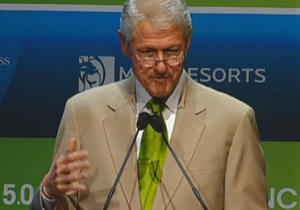Bill Clinton On Clean Energy Policy
 Lawmakers and business leaders need to rekindle a spirit of cooperation if the U.S. wants to lead in clean energy and address climate change, says Former President Bill Clinton.
Lawmakers and business leaders need to rekindle a spirit of cooperation if the U.S. wants to lead in clean energy and address climate change, says Former President Bill Clinton.Speaking at the National Clean Energy Summit in Las Vegas, President Clinton attempted to cut through the contentious political fights picked by the “denialists in Congress” and highlight the importance of cooperation in fostering smart, forward-thinking clean energy policy.
“The great winners of the world are the cooperators. Why is this important? Because cooperation gets lousy news coverage and people don’t know about it. We have to both think large and have a bias for action even if it’s small,” said Clinton.
He also encouraged the industry to continuing telling local stories of successful projects around the U.S., which he believes can diminish some of the political push-back against clean energy policy.
“If we want to do these projects, we need to make sure that more people know. Even in this highly partisan time we need to struggle for public-private cooperation. Even if the news in Washington might be disheartening because of the denialists in Congress. But across the rest of the country, the news isn’t so bad.”
Clinton outlined efficiency and renewable energy projects around the country, including the efficiency retrofit of the Empire State Building and the Ivahpah concentrating solar power project, which cumulatively created thousands of green jobs.
“Every place people do things the power of example changes consciousness,” said Clinton.
He pointed to all the construction workers he met in California working on building the 392-megawatt Ivanpah solar project — people of “all races” with some of the “best tattoos” he’d ever seen. Those construction workers are the people who are going to make the difference in moving the clean energy industry forward, said Clinton.
“Think about the tattoos. You win the tattoo vote, we’ll have the damnedest environmental policy you ever saw.”
When asked about the partisan politics stalling comprehensive climate and energy policy, Clinton said he believes that some of it will pass after November. “I think people will start thinking instead of just trying to tear the house down.”
In his final statement, Clinton encouraged people on the local level to continue working for a bipartisan consensus.
“Where ever you live, find something to do. Keep working until you find somebody of a different political persuasion with the same goal, and then figure out how to achieve it. So while you lobby for political change on the national level, it’s important to do something. Even if it seems small, it will have a big impact. Differences of opinion are important. If your purpose is to reach an agreement than your disagreements become much more valuable. We are going to have to become a stakeholder society again — that’s the only thing that works.”
You can return to the main Market News page, or press the Back button on your browser.

